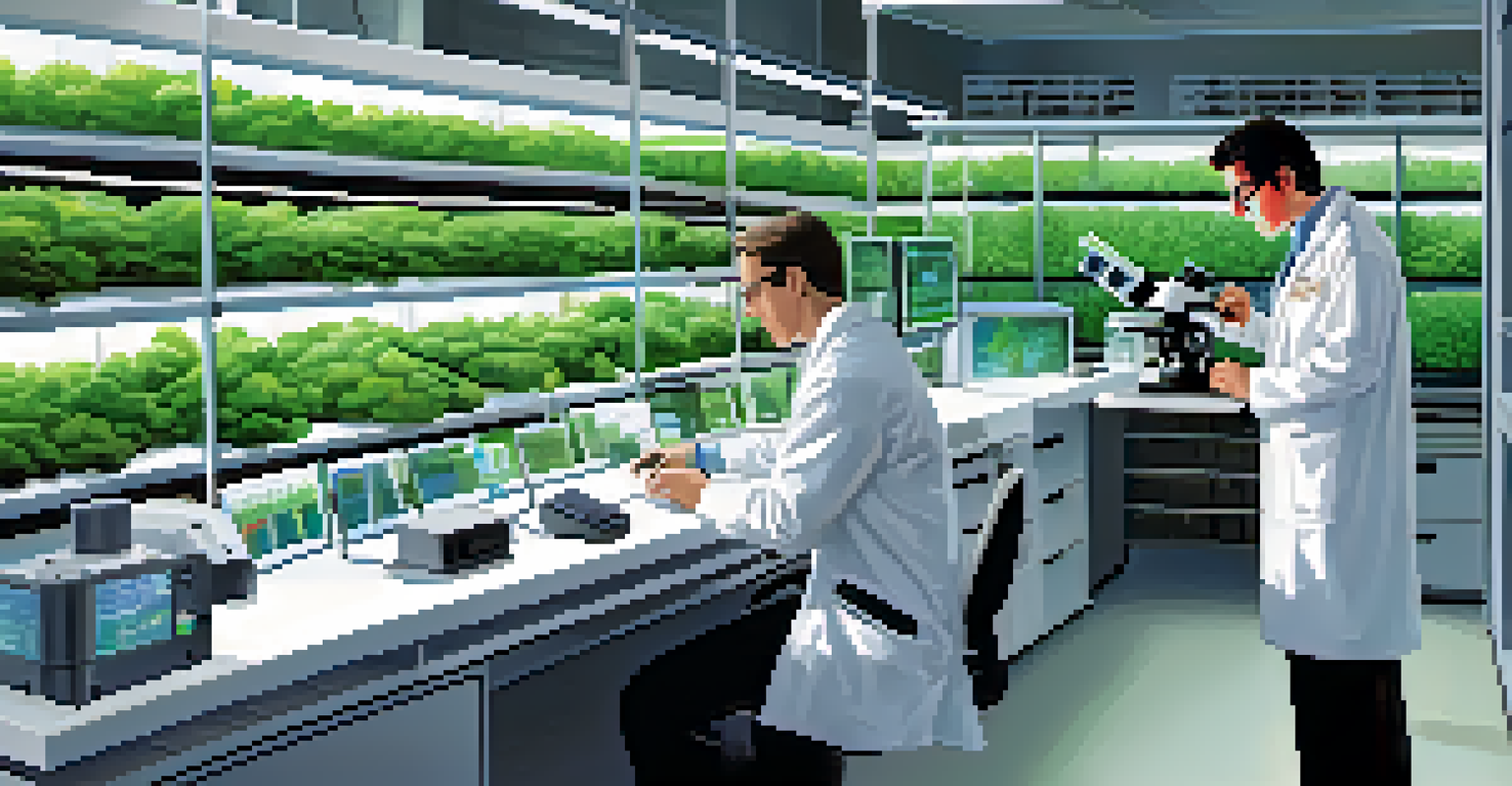Plant Biotechnology: Bridging Science and Ethical Dilemmas

Understanding Plant Biotechnology: What Is It?
Plant biotechnology refers to the techniques used to modify plants for various purposes, such as enhancing growth, resistance to pests, and nutritional value. This field combines traditional breeding practices with modern molecular biology tools, allowing scientists to create plants that can thrive in challenging conditions. For example, genetically modified organisms (GMOs) can be engineered to withstand drought, helping farmers produce crops in arid regions.
Biotechnology is the use of living systems and organisms to develop or make products, often involving the modification of genes.
At its core, plant biotechnology aims to improve agricultural efficiency and sustainability. By employing methods like gene editing, researchers can introduce specific traits into plants without the lengthy process of conventional breeding. This advancement can lead to more resilient crops that can better support global food security.
However, understanding plant biotechnology is crucial for addressing the ethical dilemmas it raises. As we delve deeper into how these technologies work, we must also consider their implications on the environment, health, and societal norms.
The Science Behind Genetic Modification in Plants
Genetic modification involves altering the DNA of a plant to achieve desired traits. Techniques such as CRISPR-Cas9 have revolutionized this process, allowing scientists to make precise edits to the genome. For instance, researchers can insert a gene from a bacteria that makes a plant resistant to a specific pest, reducing the need for chemical pesticides.

These scientific advancements have led to the development of various crops, including Bt cotton and Roundup Ready soybeans, which have significantly increased yields. The ability to engineer plants has opened doors to innovative solutions for food production, making it possible to feed a growing population sustainably.
Plant Biotechnology Enhances Agriculture
Plant biotechnology combines traditional breeding and modern techniques to create crops that are more resilient and efficient in challenging environments.
Despite these benefits, the science of genetic modification is often met with skepticism. Public concerns about the safety of GMOs and their long-term effects on ecosystems highlight the need for transparent research and communication.
Ethical Concerns Surrounding Biotechnology in Agriculture
As plant biotechnology evolves, ethical concerns have come to the forefront. One prominent issue is the potential for monopolies in the seed market, where a few companies control the majority of GMO seeds. This concentration can lead to increased prices for farmers and limit their choices, raising questions about fairness and accessibility.
The future will be about biotechnology, where we can harness the power of nature to create sustainable solutions for food and health.
Another ethical dilemma involves environmental impacts. While genetically modified crops can reduce pesticide use and increase yields, there are concerns about unintended consequences, such as loss of biodiversity and the development of resistant pests. These issues compel us to weigh the benefits of biotechnology against the potential risks to ecosystems.
Moreover, the cultural implications of GMOs cannot be ignored. Different societies have varying beliefs about food and nature, which can influence public acceptance of biotechnology. Addressing these ethical concerns requires open dialogue among scientists, policymakers, and the public.
The Role of Regulation in Plant Biotechnology
Regulation plays a pivotal role in the development and use of plant biotechnology. In many countries, governments have established frameworks to assess the safety and efficacy of GMO crops before they can be marketed. These regulations aim to ensure that biotechnology advancements do not pose risks to human health or the environment.
For instance, the U.S. Department of Agriculture (USDA) evaluates GMO crops based on their potential impact on agriculture and the environment. This rigorous assessment process helps maintain public trust in biotechnology and ensures that only safe products reach consumers.
Ethical Concerns in GMOs
The rise of genetically modified organisms raises ethical issues such as market monopolies and environmental impacts that must be carefully considered.
However, the regulatory landscape can vary significantly between countries, leading to confusion and barriers for international trade. Striking a balance between innovation and safety is essential for fostering a responsible biotechnology industry.
Public Perception and Acceptance of GMOs
Public perception of GMOs is a complex and often contentious issue. While some view genetic modification as a path to food security, others express concerns about safety and ethics. This divide can be attributed to a lack of understanding and misinformation surrounding biotechnology.
Educational initiatives and transparent communication play a vital role in shaping public attitudes toward GMOs. By providing clear and accessible information about the benefits and risks of biotechnology, we can help demystify the science and foster informed discussions.
Building trust with consumers is essential for the future of plant biotechnology. Engaging with communities to address their concerns and highlight the positive impacts of GMOs can pave the way for broader acceptance.
Sustainable Agriculture: The Promise of Biotechnology
One of the most compelling arguments for plant biotechnology is its potential to promote sustainable agriculture. By developing crops that require fewer resources, such as water and fertilizers, biotechnology can help minimize agriculture's environmental footprint. For example, drought-resistant varieties can thrive in low-water conditions, conserving valuable resources.
Additionally, biotech crops can play a crucial role in reducing greenhouse gas emissions. By improving crop yields and decreasing the need for chemical inputs, these advancements can contribute to more sustainable farming practices. This shift is vital in the face of climate change and the growing demand for food.
Public Trust and GMO Acceptance
Building public trust through education and transparent communication is crucial for fostering acceptance of GMOs and their benefits for sustainable agriculture.
Ultimately, the promise of biotechnology lies in its ability to create a more resilient agricultural system. By leveraging science to address environmental challenges, we can work towards a sustainable future for food production.
Future Perspectives: Balancing Innovation and Ethics
Looking ahead, the future of plant biotechnology hinges on finding a balance between innovation and ethical considerations. As new technologies emerge, such as gene editing and synthetic biology, it is crucial to navigate the ethical landscape thoughtfully. Engaging stakeholders from various sectors, including scientists, ethicists, and the public, will be key to addressing these challenges.
Moreover, continued research and dialogue will be essential for understanding the long-term impacts of biotechnological advancements. As we innovate, we must remain vigilant about potential consequences and work towards solutions that prioritize sustainability and equity.

In this evolving field, maintaining a commitment to ethical practices and transparency will foster trust and acceptance. By bridging the gap between science and ethics, we can harness the full potential of plant biotechnology for the benefit of society.